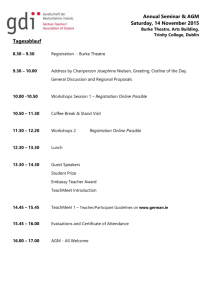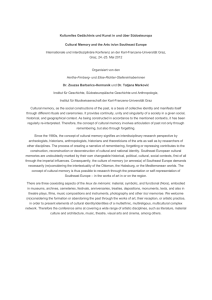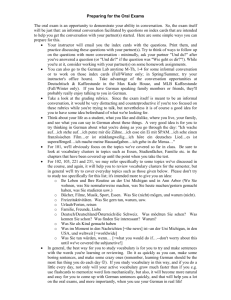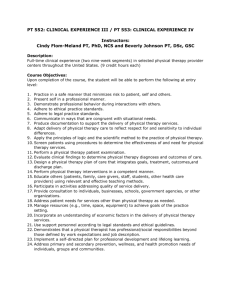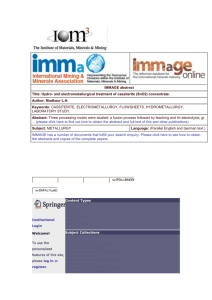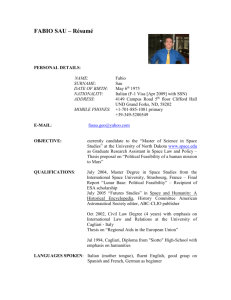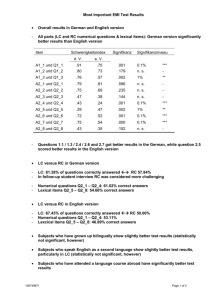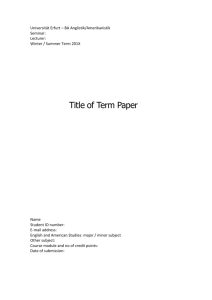Freie und Hansestadt Hamburg Behörde für Schule und
advertisement
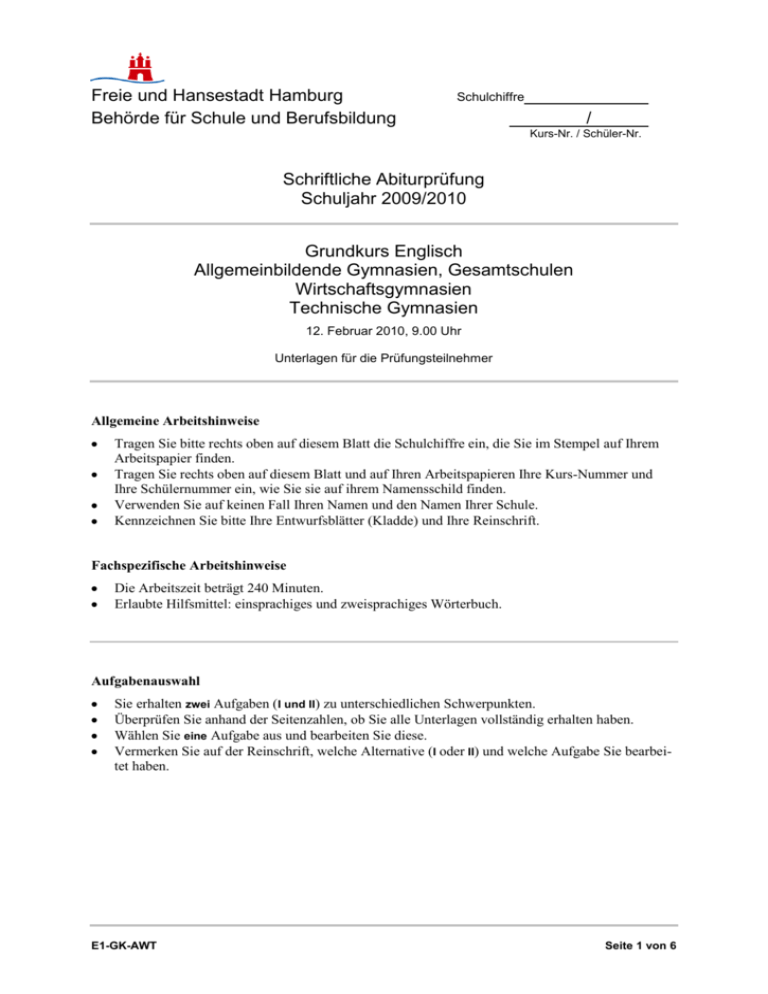
Freie und Hansestadt Hamburg Behörde für Schule und Berufsbildung Schulchiffre / Kurs-Nr. / Schüler-Nr. Schriftliche Abiturprüfung Schuljahr 2009/2010 Grundkurs Englisch Allgemeinbildende Gymnasien, Gesamtschulen Wirtschaftsgymnasien Technische Gymnasien 12. Februar 2010, 9.00 Uhr Unterlagen für die Prüfungsteilnehmer Allgemeine Arbeitshinweise Tragen Sie bitte rechts oben auf diesem Blatt die Schulchiffre ein, die Sie im Stempel auf Ihrem Arbeitspapier finden. Tragen Sie rechts oben auf diesem Blatt und auf Ihren Arbeitspapieren Ihre Kurs-Nummer und Ihre Schülernummer ein, wie Sie sie auf ihrem Namensschild finden. Verwenden Sie auf keinen Fall Ihren Namen und den Namen Ihrer Schule. Kennzeichnen Sie bitte Ihre Entwurfsblätter (Kladde) und Ihre Reinschrift. Fachspezifische Arbeitshinweise Die Arbeitszeit beträgt 240 Minuten. Erlaubte Hilfsmittel: einsprachiges und zweisprachiges Wörterbuch. Aufgabenauswahl Sie erhalten zwei Aufgaben (I und II) zu unterschiedlichen Schwerpunkten. Überprüfen Sie anhand der Seitenzahlen, ob Sie alle Unterlagen vollständig erhalten haben. Wählen Sie eine Aufgabe aus und bearbeiten Sie diese. Vermerken Sie auf der Reinschrift, welche Alternative (I oder II) und welche Aufgabe Sie bearbeitet haben. E1-GK-AWT Seite 1 von 6 Freie und Hansestadt Hamburg Behörde für Schule und Berufsbildung Abitur 2010 Allgemeinbildende Gymnasien, Gesamtschulen Wirtschaftsgymnasien, Technische Gymnasien Grundkurs Englisch, Aufgabe I Aufgabe I American Identities: The Southern States ‘Going to vote like the spirit say vote’ Foot soldiers of civil rights movement realize lifelong dream By Kevin Sack, International Herald Tribune, November 6, 2008. 5 10 15 20 25 30 35 40 45 Albany, Georgia: Rutha Mae Harris backed her silver Town Car out of the driveway early Tuesday morning, pointed it toward her polling place on Mercer Avenue and started to sing. “I’m going to vote like the spirit say vote,“ Harris chanted softly. … As a 21-year-old student, she had bellowed that same freedom song at mass meetings at Mount Zion Baptist Church back in 1961, the year Barack Obama was born in Hawaii, a universe away. She sang it again while marching on Albany’s City Hall, where she and other black students demanded the right to vote, and in the cramped and filthy cells of the city jail, which the Reverend Martin Luther King Jr. described as the worst he had ever inhabited. For those like Harris who withstood jailings and beatings and threats to their livelihoods, all because they wanted to vote, the short drive to the polls on Tuesday culminated a lifelong journey from a time that is at once unrecognizable and eerily familiar here in southwest Georgia. As they exited the voting booths, some in wheelchairs, others with canes, these foot soldiers of the civil rights movement could not suppress either their jubilation or their astonishment at having voted for an AfricanAmerican for president of the United States. … “King made the statement that he viewed the Promised Land, won’t get there, but somebody will get there, and that day has dawned,“ said Boyd, 81, who pushed his wife in a wheelchair to the polls late Tuesday morning. “I’m glad that it has.“ … Yes, the world had changed in 47 years. At City Hall, the offices once occupied by the segregationist mayor, Asa Kelley Jr., and the police chief, Laurie Pritchett, are now filled by Mayor Willie Adams and Chief James Younger, both of whom are black. But much in this black-majority city of 75,000 also seems the same: neighborhoods remain starkly delineated by race, blacks are still five times more likely than whites to live in poverty and the public schools have so resegregated that 9 of every 10 students are black. Harris, a retired special education teacher who was jailed three times in 1961 and 1962, was so convinced that Obama could not win white support that she backed Senator Hillary Rodham Clinton in the primaries. “I just didn’t feel it was time for a black man, to be honest,“ she said. “But the Lord has revealed to me that it is time for a change.“ … Among the things Harris appreciates about Obama is that even though he was in diapers while she was in jail, he seems to respect what came before. “He’s of a different time and place, but he knows whose shoulders he’s standing on,“ she said. When the movement came to Albany in 1961, fewer than 100 of the Dougherty County’s 20,000 black residents were registered to vote, said the Reverend Charles Sherrod, one of the first field workers sent here by the Student Nonviolent Coordinating Committee. Literacy tests made a mockery of due process – Boyd remembers being asked by a registrar how many bub- E1-GK-AWT Seite 2 von 6 Freie und Hansestadt Hamburg Behörde für Schule und Berufsbildung Abitur 2010 Allgemeinbildende Gymnasien, Gesamtschulen Wirtschaftsgymnasien, Technische Gymnasien Grundkurs Englisch, Aufgabe I 50 55 60 bles were in a bar of soap – and bosses made it clear to black workers that registration might be incompatible with continued employment. … Sherrod, 71, who settled in Albany and continues to lead a civil rights group here, argues that the movement succeeded; it simply took time. … “This is what we prayed for, this is what we worked for,“ he said. “We have a legitimate chance to be a democracy.“ … Mount Zion has now been preserved as a landmark, attached to a new $ 4 million civil rights museum that was financed through a voterapproved sales tax increase. Across the street, Shiloh Baptist, founded in 1888, still holds services in the sanctuary where King preached at mass meetings. Among those leading the worship Sunday was the associate pastor, Henry Mathis, 53, a former city commissioner whose grandmother was a movement stalwart. He could not let the moment pass without looking back. ... “We sang through the years that we shall overcome, but our Father, our God, we pray now that you show that we have overcome.” (716 words) From: International Herald Tribune – The Global Edition of the New York Times. Thursday, November 6, 2008, p.6 E1-GK-AWT Seite 3 von 6 Freie und Hansestadt Hamburg Behörde für Schule und Berufsbildung Abitur 2010 Allgemeinbildende Gymnasien, Gesamtschulen Wirtschaftsgymnasien, Technische Gymnasien Grundkurs Englisch, Aufgabe I Assignments Comprehension 1 Summarise the article. Analysis 2.1 Analyse the reasons why the people portrayed in the article are so satisfied with Obama’s success. 2.2 Examine the means the author uses to convey the mood of Election Day. Comment / Creative Writing (Choose one.) 3.1 Mount Zion Baptist Church was a place where those civil rights marches that ended in jail started. Today it is a publicly-funded museum. Comment on the question as to what extent the changes mentioned in the article reflect the reality of black people in the Southern States today. or 3.2 As soon as it is clear that Barack Obama has won the election, Rutha Mae Harris goes home and writes a letter to him telling him about her past and her hopes for the future. Write that letter. Die vier Teilaufgaben haben gleiches Gewicht; sie gehen mit jeweils 25% in die Bewertung des Inhalts ein. E1-GK-AWT Seite 4 von 6 Freie und Hansestadt Hamburg Behörde für Schule und Berufsbildung Abitur 2010 Allgemeinbildende Gymnasien, Gesamtschulen Wirtschaftsgymnasien, Technische Gymnasien Grundkurs Englisch, Aufgabe II Aufgabe II Marketing to Young People: Branding and Advertising This is part of a short story titled “The Loneliness of the Long-distance Runner”, published in 1959. The protagonist and I-narrator Colin is a poor Nottingham teenager. After his father died, his family, i.e. his mother and his brother Mike, get 5oo £ (about 2000 £ today) from the insurance company. They spend the money on buying a TV set, a new carpet and a new bed for mother. [1975 edition, London, pages 19 – 21] 5 10 15 20 25 30 35 Night after night we sat in front of the telly with a ham sandwich in one hand, a bar of chocolate in the other, and a bottle of lemonade between our boots, while mam was with some fancy-man upstairs on the new bed she’d ordered, and I’d never known a family as happy as ours was in that couple of months when we’d got all the money we needed. And when the dough ran out, I didn’t think of anything much, but just roamed the streets – looking for another job, I told mam – hoping I suppose to get my hands on another five hundred nicker so’s the nice life we’d got used to could go on and on for ever. Because it’s surprising how quick you can get used to a different life. To begin with, the adverts on the telly had shown us how much there was in the world to buy than we’d ever dreamed of when we’d looked into shop windows but hadn’t seen all there was to see because we didn’t have the money to buy it with anyway. And the telly made all these things seem twenty times better than we’d ever thought they were. Even adverts at the cinema were cool and tame, because now we were seeing them in private at home. We used to cock our noses up at things in shops that didn’t move, but suddenly we saw their real value because they jumped and glittered around the screen and had some pastyfaced tart going head over heels to get her nail-polished grabbers on to them or her lipstick lips over them, not like the crumby adverts you saw on posters or in the newspapers as dead as doornails; these were flickering around loose, half-open packets and tins, making you think that all you had to do was finish opening them before they were yours like seeing an unlocked safe through a shop window with the man gone away for a cup of tea without thinking to guard his lolly. The films they showed were good as well, because we couldn’t get our eyes unglued from the cops chasing the robbers who had satchel-bags crammed with cash and looked like getting away to spend it – until the last moment. I always hoped they would end up free to blow the lot, and could never stop wanting to put my hand out, smash into the screen and get the copper into a half-nelson so’s he’d stop following the bloke with the money bags. […] So on this foggy night we tore ourselves away from the telly and slammed the front door behind us, setting off up our wide street like slow tugs on a river that’d broken their hooters, for we didn’t know where the housefronts began what with the perishing cold mist all around. I was snatched to death without an overcoat: mam had forgotten to buy me one in the scrimmage of shopping, and by the time I thought to remind her of it the dough was all gone. So we whistled “The Teddy Boys Picnic” to keep us warm, and I told myself that I’d get a coat soon if it was the last thing I did. Mike said he thought the same about himself, adding that he’d also get some brand-new glasses with gold rims, to wear instead of his wire frames they’d given him at the school clinic years ago. (666 words) E1-GK-AWT Seite 5 von 6 Freie und Hansestadt Hamburg Behörde für Schule und Berufsbildung Abitur 2010 Allgemeinbildende Gymnasien, Gesamtschulen Wirtschaftsgymnasien, Technische Gymnasien Grundkurs Englisch, Aufgabe II Annotations line 5: dough line 7: nicker ll. 16/17 pasty-faced tart (derog) line 22 lolly here: money here: money G: „käsebleiches Mädchen“ here: money Assignments Comprehension 1 Describe how Colin and his family behave as consumers and how they spend their free time. Analysis 2.1 Compare advertising in Mike’s times to advertising today. 2.2 Examine the point of view and its effect on the reader. Comment / Creative Writing (Choose one) 3.1 Comment on the dangers of marketing, starting from the impact it has on Mike and Colin. or 3.2 Write the diary entry of a teenager who tries to come to terms with the temptations created by advertising today, similar to those described in the text. Die vier Teilaufgaben haben gleiches Gewicht; sie gehen mit jeweils 25% in die Bewertung des Inhalts ein. E1-GK-AWT Seite 6 von 6
